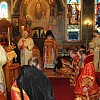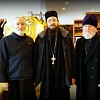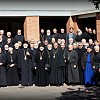Diocese of Eastern Pennsylvania Holds Annual Men's Retreat at St. Tikhon's Seminary - 12/01/07
The Diocese of Eastern Pennsylvania Men's Retreat was held at St. Tikhon's on Saturday December 1 to engage the topic “Fertility, Medicine, and Men.” Leon Sheean, PhD, brought years of professional scientific experience to bear on the difficult ethical questions surrounding the advances of medicine in the field of fertility and reproductive technology.
(5 images)
Clergy, seminarians, and interested laymen gathered in a classroom at St. Tikhon's Seminary this past Saturday for a timely presentation in the realm of bioethics confronting our faithful: what to make of the rise of new medical technologies for the conception of life. Leading the retreat was Dr. Leon Sheean, whose PhD in Reproductive Biology and Biochemistry makes him an excellent guide through the complex world of the fertility clinic. Dr. Sheean spent years working in medical research science, studying how the placenta produces the hormones that sustain a healthy pregnancy. Initially, his research was geared towards the livestock industry, but he was later asked to apply his expertise to the study of human infertility in the clinical setting. He worked in this field for many years before retiring because of a growing sense of unease about the ethical ramifications of some of the practices common in fertility clinics. Dr. Sheean led the retreat's participants through an in-depth survey of the biology of healthy reproduction and the factors contributing to fertility and infertility. He then guided the group through an overview of the treatments and procedures available in modern fertility clinics, leading to a discussion of their ethical dimensions and the response of the Orthodox Church on these matters thus far.
Within the last century, the turbulent waters of the sexual revolution combined with the seismic advances in reproductive medicine and technology have unleashed something of a tsunami of social change on our civilization, breaching through many of the traditional boundaries of family structure and flooding the Church with questions about how its faithful should navigate such inhospitable elements. New fertility technologies, available thanks to developments in the field of reproductive medicine, surely number among the most perplexing of the ethical questions awash in this wave of change.
The modern fertility clinic promises to alleviate the suffering of many barren couples whose desire for children is frustrated due to biological causes sometimes beyond their control. At the same time, some of the treatments for clinical infertility advanced by these clinics raise a host of ethical difficulties which have never before been confronted: the donation of sperm or eggs; surrogate motherhood; hormonal treatments and medicines to induce “super-ovulation” in a woman; in-vitro fertilization and the related issues of the creation and storage of multiple zygotes—eggs fertilized by union with a sperm cell.
Clinically, infertility is defined as the inability of a couple to become pregnant over a twelve-month period of active and timely intercourse. The great complexity of the human reproductive system means that there are a variety of factors affecting fertility, and that it can be difficult to isolate the precise cause of infertility in a couple.
Sometimes, doctors are able to locate and attribute the problem to a particular factor, and the couple is able to conceive by removing a drug from the system or avoiding unfavorable environmental factors such as heat or certain chemicals. If blockage of a tube in the reproductive system is the culprit, surgical correction is sometimes possible. Not infrequently, conception is possible simply by increased, sustained attention to the precise timing and detection of the woman's ovulation, when the window for conception is open.
Other times, when the cause of infertility is less clear (or the couple is more impatient with trial and error), clinics recommend more drastic medical solutions to infertility. Some of the most common procedures include special medication, “sperm-washing,” and in-vitro fertilization. Dr. Sheean's extensive technical knowledge of these procedures makes him a very valuable voice within the Orthodox community, as our Church articulates her response to the ethical issues raised. Much of the retreat was devoted to the explanation of these fertility treatment options and whether they may be pursued in good conscience by an Orthodox Christian. This article will present a basic summary of the procedures that Dr. Sheean explained to retreat participants.
Most often, when more basic solutions to infertility have been ruled out, medical technology is used to enhance manually the factors for fertility, both male and female, through laboratory-assisted conception. Such a conception is almost always achieved independently of the act of married sexual relations, a fact which certainly necessitates theological reflection and pastoral guidance on the part of our Church. It is the author's impression that the idea of a laboratory-assisted conception achieved outside the act of intercourse was received by many retreat participants unfavorably and with a sense of hesitation. Far more troubling questions arise as we examine the specific procedures normally employed at fertility clinics to arrive at a successful pregnancy.
Much of the business of the fertility clinic is a numbers game: increasing the odds of conception by increasing the number of eggs available in the woman and increasing the number of active and healthy sperm that are able to fertilize the egg. The woman's ovaries are pushed into overdrive by use of medication. In one cycle, multiple eggs begin ripen and are released, and doctors are then able to extract them. A man's semen undergoes “sperm washing,” a selective process by which the misshapen, abnormal, or inactive cells are removed from the sample and the active swimmers are isolated and prepared for delivery to the egg(s).
The other necessary factor for conception addressed by the fertility clinic is the availability of a hospitable environment for the sperm to unite with the egg, and for the fertile zygote to begin its development. Sperm do not always survive the long journey all the way to the egg, especially if they are poor swimmers or if their count is low. One means to aid their successful arrival is intra-uterine insemination: doctors allow the egg(s) to take their normal course within the woman's body, and at the measured time of ovulation, deliver the “washed” sperm sample directly into the woman's fallopian tube by means of a catheter.
It is also possible for doctors to substitute the laboratory for the womb in order to ensure a hospitable environment for conception and to accomplish the observable union of sperm and egg. This is the technique we know as in-vitro fertilization. A number of eggs are collected from the woman and placed in a nutrient solution suited for the earliest stages of an embryo's growth. A “washed” sample of sperm is then introduced in the same environment, allowing “competition” among free-swimming sperm to occur until one of them is united to the egg to form a zygote, which then begins cell division in the normal process of embryonic development. The most extreme and intrusive form of in-vitro fertilization possible is the injection of a single sperm cell directly into a single egg to create a zygote.
In-vitro fertilization in either form thus raises the ethical question of the appropriateness of human selection in the pairing of egg and sperm. Already, it is possible to use sperm washing in order to predetermine the gender of a child with almost 90% success. Are we but a step away from fertility clinics easily yielding to consumer demand so that even fertile couples can build a designer child? A great potential exists for the abuse of sperm-washing and direct-injection fertilization, which are both promising tools for eugenic projects, for the elimination of conceptions yielding defects and inherited diseases, and for the consumerization of the mystery of human creation. Troubling signs in this direction are presently apparent: gender selection is already an advertised reality, and one can find a veritable menu of sperm donors at any given fertility clinic with a complete description of their characteristics including race, level of education, height, weight, eye color, and even religion.
After the successful conception of several zygotes, doctors observe the development of the embryo as it undergoes its initial cell divisions. These cells, incidentally, are the infamous embryonic stem cells, which have yet to specialize in their function and are able to reproduce and become the basis for all the varieties of human tissue. When the zygote reaches a certain level of cellular division, doctors take several of the most promising embryos and implant them back into the woman's uterus, where, it is hoped, one or several of them will implant properly on the uterine wall and continue human development to birth. Doctors found that the extraction, fertilization and implantation of one single egg into the uterus produced a successful pregnancy in no more than 5% of the cases.
Once again, the fertility clinic is engaged in beating the odds: not all fertilized eggs will continue in normal cell division in the laboratory to be implantable, and not all implanted zygotes will survive to full term. When multiple implanted zygotes do develop to full term, we encounter the well-known phenomenon of multiple pregnancies. Since it is not unusual for multiple embryos to survive to full term, there is a reasonable limit to the number of zygotes that can be returned to the womb at a time. For this reason, there are very frequently “left-over” zygotes, eggs that have been successfully fertilized with sperm and begun human development, but which cannot be implanted in the womb for fear of overloading it. These zygotes may be frozen for cryopreservation without harm and stored indefinitely until the mother's womb is again available, at which time they may be thawed and implanted. Or they may simply be discarded. Or donated to research. Frequently, when fertility treatment yields a successful pregnancy, the couple, having achieved what was desired, does not return for the frozen embryos, and they are forgotten in storage.
It is here that the fertility clinic must bear the greatest ethical scrutiny from the Orthodox Church. According to the Church, human life begins at conception, the moment of union between sperm and egg. In fertilizing an egg we have created not a mere zygote but a human person with a soul. The abandonment or destruction of a helpless human person (though only grown to a few cells) is condemnable in the severest ethical terms: it is murder. This includes the donation of zygotes to science for research, which amounts to the dismemberment of a person for the harvest of stem cells or some other such reprehensible project. Under no circumstances may an Orthodox Christian be involved with fertility procedures that result in the discarding or destruction of human embryos. We must not kill to create.
The myriad of highly problematic ethical questions raised by the advances in fertility medicine have only begun to be addressed officially by our Church. While the matters before us are definitely urgent, much prayer and discernment is necessary so that hasty and regrettable decisions be avoided. The OCA's 10th All-American Council in 1992 issued a document “On Marriage, Family, Sexuality, and the Sanctity of Life,” which states that “married couples may use medical means to enhance conception of their common children, but the use of semen or ova other than that of the married couple who both take responsibility for their offspring is forbidden.” According to Dr. Sheean, this position currently permits the use of corrective surgery, intra-uterine insemination of the husband's sperm, the use of medications, and in-vitro fertilization. By extension of the principles elucidated, the use of a womb other than the wife's, that is, the hiring of a surrogate mother, is forbidden.
One must wonder if these initial prohibitions will be extended upon further reflection to disallow the use of in-vitro fertilization as it normally involves, even in the best case scenario, the fertilization and implantation of several zygotes into the womb, with one or several of these almost expected not to survive. This author, at least, questions the wisdom of creating life outside the normal environment of the womb when there is no guarantee that we can bring it to full development. Another ethical question that will eventually have to be answered is whether an Orthodox Christian might be permitted the role of a surrogate mother in order to adopt an abandoned, cryo-preserved embryo.
The questions are certainly perplexing and there seems to be no indication that medical science will be deferring its research in controversial fields until Christian ethicists have a chance to weigh in. For this reason, a man like Dr. Sheean is a wonderful gift to our Church, as he is able to educate all of our faithful, both clergy and laity, on the difficult issues at hand. St. Tikhon's is certainly grateful to Dr. Sheean for his patience in helping us to understand the practices currently in use in the medical field and and guiding us to discern the challenges posed by them to our Orthodox Faith. If we are not yet able to express all the right answers, at least we are able to ask the right questions, thanks to faithful men of science like him. Let us pray and trust that the Holy Spirit will guide the Church in all truth as He always has.
By Christopher McGarvey, 1st Year M. Div. Student-OCA Diocese of the Midwest
|
| |||||||||||||
Physical Address:
178 St. Tikhon's Road
Waymart, PA 18472
Mailing Address:
Post Office Box 130
South Canaan, PA 18459
Phone: 570-561-1818





